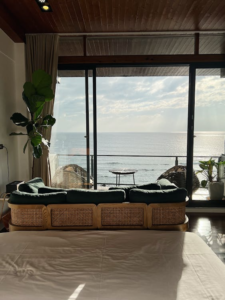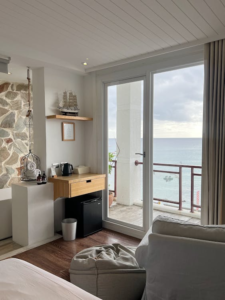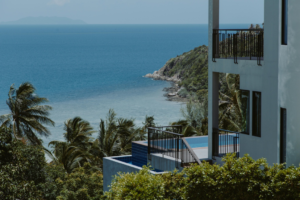
Taxes and Currency
Costa Rica’s tax structure is straightforward for expats. The country uses a territorial system, which means that income earned abroad—such as retirement savings or pensions—is not taxed. Only income generated inside Costa Rica, such as through a local business or rental property, is subject to taxation. Business owners typically charge and pay 13% on sales, while income tax rates for local operations are around 17%.
Property tax is described as minimal, set at only 0.25% of a property’s registered value. Sales tax of 13% applies to most goods and services, and restaurants often add a 10% service charge, which is the standard tip. This simple structure helps expats manage budgets with few surprises.
The local currency is the Costa Rican Colón, valued at about 500 colones to one U.S. dollar in 2025, though it fluctuates. U.S. dollars are widely accepted in shops, restaurants, and hotels, making day-to-day transactions straightforward.
Groceries and Shopping
 Expats often notice that food prices vary depending on shopping choices. Local markets offer fresh produce and staples at affordable rates, while imported products cost more. Many items are available, and the range of goods has expanded in recent years. Although most products are imported, making some items less predictable to find, overall availability continues to improve.
Expats often notice that food prices vary depending on shopping choices. Local markets offer fresh produce and staples at affordable rates, while imported products cost more. Many items are available, and the range of goods has expanded in recent years. Although most products are imported, making some items less predictable to find, overall availability continues to improve.
Everyday groceries purchased at local markets are affordable, with local food described as both fresh and cost-friendly. Expats who adjust to local diets often find their costs lower compared to their home countries. Those who prefer imported goods should expect higher prices, largely due to import duties and shipping costs.
Dining Out: Local and Expat Options
Dining costs vary depending on where you choose to eat. Local restaurants, known as sodas, serve traditional Costa Rican dishes at prices that are described as refreshingly low. Meals are hearty, affordable, and widely available.
International or expat-oriented restaurants, particularly steakhouses or high-end dining establishments, naturally cost more. Prices for these meals resemble what you would pay in the United States or Europe. Many expats balance the two options by eating local most days and reserving international meals for special occasions.
Healthcare Access and Affordability
 Healthcare is another area where expats often save money compared to their home countries. Costa Rica offers both public and private options. Expats who become residents can join the public healthcare system by paying a monthly contribution, which grants access to doctors, hospitals, and medications.
Healthcare is another area where expats often save money compared to their home countries. Costa Rica offers both public and private options. Expats who become residents can join the public healthcare system by paying a monthly contribution, which grants access to doctors, hospitals, and medications.
Private healthcare is widely available in larger towns and cities, with modern facilities and bilingual staff. Expats often choose a combination: relying on the public system for regular needs while using private care for faster service. Both systems are more affordable than healthcare costs in North America.
Property Ownership and Housing
For expats interested in property, Costa Rica stands out. Foreigners can own real estate outright with the same rights as locals. Residency is not required for ownership. The only exceptions involve beachfront or maritime zone land, which have specific regulations, but even then, expats can often purchase through careful due diligence.
Property taxes remain minimal, making long-term ownership affordable. Many expats describe this as one of the country’s most appealing financial advantages.
Daily Life and Overall Costs

Transportation also favors affordability. Gasoline prices are described as reasonable compared to Europe, and most expats drive less than they would in their home countries. Everyday expenses add up to a lifestyle that feels comfortable without requiring the same budget as back home.
Costa Rica Sunset Homes Guides Expats to Smart Real Estate Choices
At Costa Rica Sunset Homes, we help expats evaluate the Costa Rica real estate market with confidence. Whether you are considering Playas del Coco properties or Ocotal Beach homes for sale, our team is here to guide you. From Tamarindo Beach rentals to Playa Flamingo properties, we show you options that fit both lifestyle and budget.
We also support those looking for rental properties or researching retirement communities in Costa Rica. Your future home in Costa Rica is closer than you think. Contact us today!










